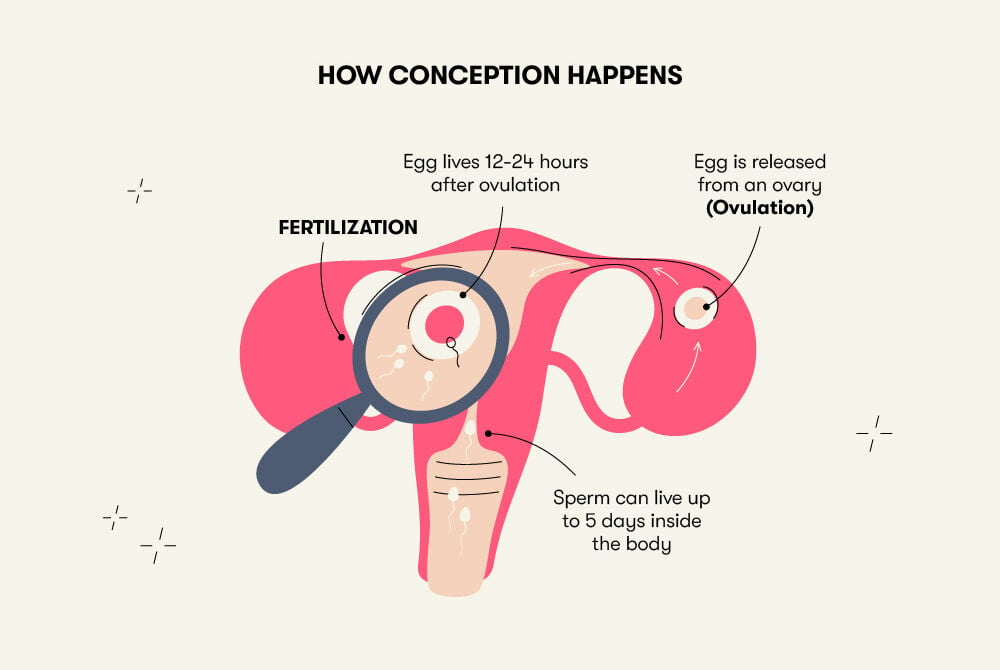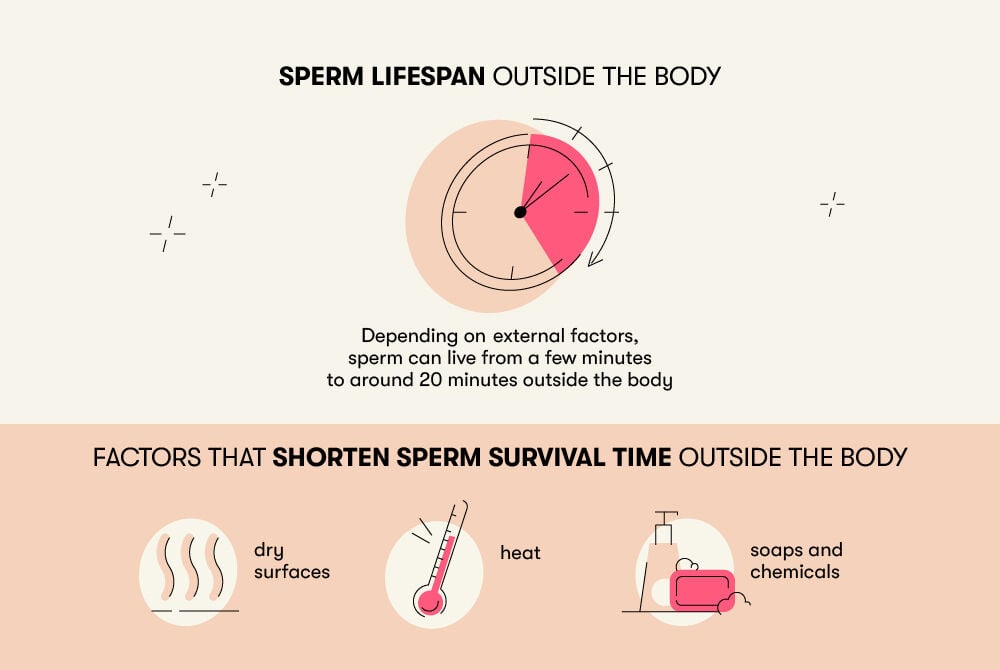There are a few different ways that pregnancy can happen when someone is within their fertile window. Keep reading to learn all about what Flo’s medical experts say about getting pregnant with no intercourse.
-
Tracking cycle
-
Getting pregnant
-
Pregnancy
-
Help Center
-
Flo for Partners
-
Anonymous Mode
-
Flo app reviews
-
Flo Premium New
-
Secret Chats New
-
Symptom Checker New
-
Your cycle
-
Health 360°
-
Getting pregnant
-
Pregnancy
-
Being a mom
-
LGBTQ+
-
Quizzes
-
Ovulation calculator
-
hCG calculator
-
Pregnancy test calculator
-
Menstrual cycle calculator
-
Period calculator
-
Implantation calculator
-
Pregnancy weeks to months calculator
-
Pregnancy due date calculator
-
IVF and FET due date calculator
-
Due date calculator by ultrasound
-
Medical Affairs
-
Science & Research
-
Pass It On Project New
-
Privacy Portal
-
Press Center
-
Flo Accuracy
-
Careers
-
Contact Us
Can You Get Pregnant Without Having Sex? Experts Explain How It Can Happen


Every piece of content at Flo Health adheres to the highest editorial standards for language, style, and medical accuracy. To learn what we do to deliver the best health and lifestyle insights to you, check out our content review principles.
How does conception happen?
Conception happens when sperm joins a healthy egg, usually by swimming up through the vagina. Simply speaking, conception happens when sperm and egg meet each other. But for this to happen, this meeting needs to occur at the proper time, place, and circumstances (ovulation). During ovulation, the ovaries release one or more eggs, which travel down one of the uterine tubes toward the uterus.
Ovulation typically occurs 12 to 16 days before your next period, but the exact timing can vary from month to month. In 2020, Flo collaborated with the University of Adelaide to conduct a large study on cycle length. It showed that only one in seven females in the study ovulated on the 14th day of their cycle.
Sometimes, ovulation might occur twice within one cycle, or an egg could be released from the ovary right before a period. Once the egg is released, it can live for 12 to 24 hours. Because sperm can live inside the female reproductive system for up to five days, the five days leading up to ovulation and the day after are known as the fertile window.
The fertile window is when it’s possible to get pregnant. The precise timing of the fertile window can be difficult to predict. Tracking your cycle with Flo and using ovulation kits can help you predict the timing of your fertile window more accurately.
Millions of sperm are released in each ejaculation. Most or almost all of them will die on the journey toward the egg, but it only takes one sperm fertilizing an egg for conception to happen.

How can you get pregnant with no intercourse?
If you’re wondering if you can get pregnant without penetration, the answer is yes.
A study published in 2019 studied 20 pregnant women who had vaginismus in Tunisia, a condition that affects around one percent of the global female population. Vaginismus causes spasms in the vagina that prevent penetration during sex. The researchers found that 65 percent of them conceived without vaginal penetration (ejaculation occurred outside the vagina), and the rest either used artificial insemination or other assisted reproductive technology to get pregnant.
Can conception happen if sperm is on the outside of the vagina?
Can you get pregnant if sperm is on the outside of the vagina? What if sperm gets near the vagina?
In order for conception to take place, sperm needs to enter the vagina. This is still possible even if a partner does not ejaculate inside the vagina, though. For example, if there’s semen on the fingers and they come into contact with the vagina during the fertile window, then conception is possible. But sperm has to meet certain parameters to make natural conception possible. This means that in addition to the presence of semen in the vagina, sperm concentration, motility, and some other characteristics may play a role as well.
So if a partner ejaculates and some semen touches the vagina, pregnancy is possible. If an erect penis touches the vagina or vulva, precum that contains sperm can also fertilize an egg and result in pregnancy.
Take a quiz
Find out what you can do with our Health Assistant
How deep does sperm need to go to conceive?
There are lots of pregnancy myths and speculation about which sex positions are the best for conception by allowing sperm to reach deeper into the vagina. You may have heard that deep penetration boosts the chances of getting pregnant.
There’s no scientific evidence to support the idea that any one position makes it easier to conceive. Following ejaculation, sperm enters the vagina, swims toward the cervix, and can enter the uterine tubes within minutes.

Pregnancy Paranoia: How to Handle It
Read medically reviewed articles on topics like this
How long does sperm live outside the body?
There’s a myth that sperm dies as soon as it comes into contact with air. While oxygen doesn’t kill sperm, it will die as soon as the semen dries out. This can be just a matter of minutes, depending on the surface it’s on. Ejaculation on sheets, another body part, or clothing will dry out quicker than in warm water, such as in a bath.

If clothing or material is completely saturated with wet semen and comes into direct contact with the vagina, there is a very small chance that sperm could swim inside the vagina and cause pregnancy, but it’s very unlikely.
Similarly, if someone ejaculates in warm water, there’s a very slight chance that sperm could enter the vagina and result in pregnancy, but again, it’s not likely. If it’s a hot tub, pool, or bubble bath, the chemicals will kill the sperm cells in a matter of seconds, and pregnancy is almost impossible.
Pregnancy with assisted reproductive technology
Artificial insemination is a kind of assisted reproductive technology (ART) and another way that conception can technically happen without having sex. It involves inserting sperm into the uterus in the hopes that it will swim up the uterine tubes and fertilize an egg.
Takeaway
While it’s not nearly as common as pregnancy as a result of intercourse, it’s still possible to get pregnant without having intercourse. For conception to occur, sperm needs to enter the vagina or otherwise come in contact with an egg. Sperm can live inside the female reproductive system for up to five days, and pregnancy is possible if these five days coincide with the time of ovulation.


Hey, I'm Anique
I started using Flo app to track my period and ovulation because we wanted to have a baby.


The Flo app helped me learn about my body and spot ovulation signs during our conception journey.


I vividly
remember the day
that we switched
Flo into
Pregnancy Mode — it was
such a special
moment.
Real stories, real results
Learn how the Flo app became an amazing cheerleader for us on our conception journey.




